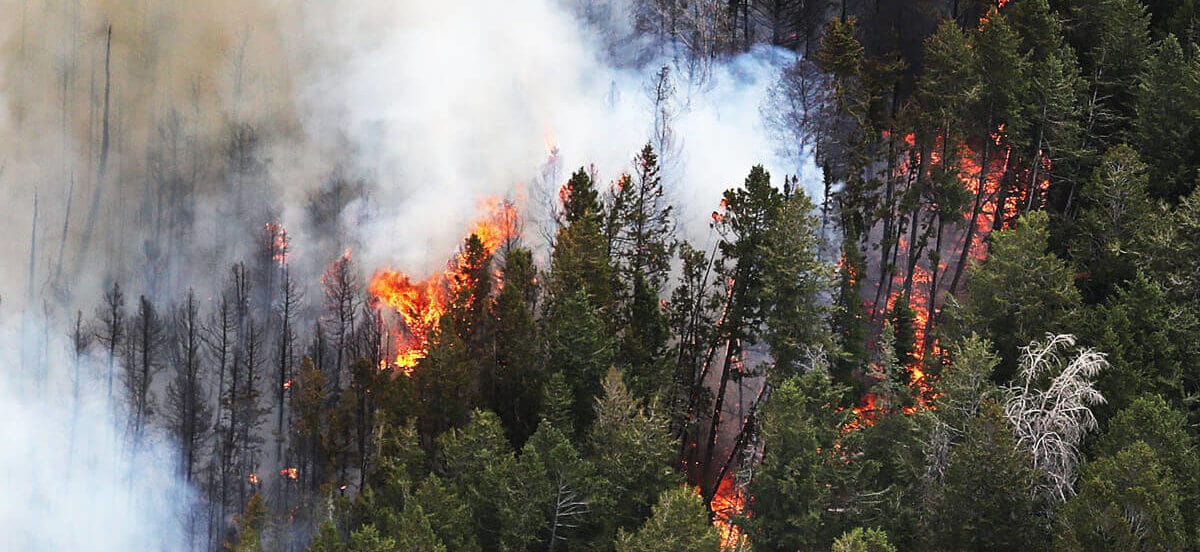The 2017 fire season in North America was the worst on record and the 2018 fire season is quickly gaining on that unfortunate record. This week alone, the Dollar Ridge Fire has raged across Central Utah, taking with it the homes of hundreds of Utah residents and causing unsafe air quality throughout Central Utah. The Dollar Ridge Fire highlights the need for Utah’s politicians to think about and care about climate change. This summer has been particularly hot, and anyone with a smart phone might have noticed the influx of red flag warnings over the last few weeks. The treacherous heat and lack of rain in the recent weeks, both of which are related to global climate change, have caused a myriad of fires throughout the Rocky Mountain West. This week in Utah the Dollar Ridge fire has caused over 1,000 Utahns to lose their homes and thousands to suffer the consequences of the unsafe air quality associated with the smoke from the fire. Currently, the fire is only 50% contained and currently covers 52,256 Acres near Duchesne, Utah.
Clearly, we are seeing the effects of climate change right in Utah. The Union of Concerned Scientists writes: “The effects of global warming on temperature, precipitation levels, and soil moisture are turning many of our forests into kindling during wildfire season.” As our climate warms and the average temperature across the globe increases, soil and tree water retention decreases because of increased evaporation due to the higher temperatures. This increases the risk of fires significantly because a spark can spread quickly in a dry forest. Droughts are also closely associated with changing weather patterns due to climate change and droughts, like the one we have experienced in Utah during the past several weeks, also contribute to increased forest fires.
Forest fires not only threaten the homes and possessions of Utah’s residents, they also cause decreased air quality. The smoke from the Dollar Ridge Fire affected people as far away as the Salt Lake City area. Utah County air quality was classified in the “red zone” this week due to the smoke from the Dollar Ridge fire and the Department of Environmental Quality recommended that Utah County residents stay inside as much as possible.
Many of Utah’s politicians are not supportive of policies that would mitigate the effects of climate change. Although the fire was started by a human, dry climate conditions ultimately facilitated the growth and spread of the Dollar Ridge Fire. Hopefully, the recent increase in fires across the state will cause politicians to reconsider their stance on carbon emissions and global warming. Many states have taken large steps to join the global fight to slow or even reverse climate change. Some states have implemented carbon emission trading systems, strong renewable energy project incentives, stricter car emissions regulations, and requirements that car dealers sell electric vehicles. There are hundreds of laws that the state of Utah could implement to mitigate the state’s carbon emissions and contributions to global climate change.
As fires rage across the West, swallowing up homes and lives in their path, it is important to think about the role that global climate change plays in creating the worst fire seasons to date and the way that states can contribute to lessening the effects of climate change by reducing our carbon emissions. Hopefully, seeing the effects of climate change on the lives of Utahns will convince our politicians to rethink our state’s need for effective and comprehensive policy to reduce our carbon emissions and contribution to global climate change. If Utah’s politicians are serious about improving the living conditions of Utahns, they should join the fight in mitigating the impacts of global climate change by acting aggressively to enact appropriate state policies.
Beau Bown is a communications intern with Alliance for a Better Utah.

